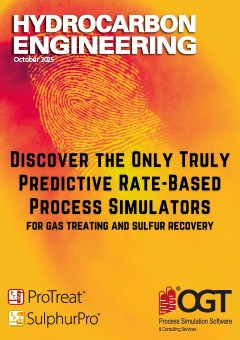Editorial comment
Naturally, many of the pages within each issue of Hydrocarbon Engineering are devoted to the issue of climate change and the role that our sector can play in developing more sustainable operations.
Register for free »
Get started now for absolutely FREE, no credit card required.
Just take a look through the contents of this issue, for example. We have articles exploring how refineries can select different technologies to mitigate sulfur dioxide emissions (p. 25) and how advanced air control technology can aid process efficiency and ensure environmental compliance for SRUs (p. 29). You can read about how in-situ gas analysers can support the industry’s goals to limit its carbon footprint (p. 35), why decentralised LNG infrastructure offers an advantage in today’s energy transition landscape (p. 37), and how electrical condition monitoring can promote sustainability by extending equipment life and minimising energy waste (p. 45). We have an article looking at the role that emissions abatement solutions play in ensuring hydrocarbon operations meet the needs of a lower-carbon future (p. 54), and you can discover how modern flare monitoring solutions can address the dual imperatives of regulatory compliance and operational optimisation (p. 59), as well as how mobile emissions control technology can help operators comply with environmental regulations (p. 63). This issue also includes articles looking at how different flow meter designs can be optimised to aid energy efficiency (p. 67), the role of compressors and dry gas seals in reducing emissions (p. 71), and how robotic convection cleaning can support sustainability objectives in styrene production (p. 75).
In summary, Hydrocarbon Engineering places sustainability at the heart of its coverage. That is why, last year, we launched a new supplement dedicated solely to exploring innovative decarbonisation technology and solutions that are driving the transition to a low-carbon energy future. The mission of EnviroTech was to create a resource where we could explore some of the topics above in greater detail, while also devoting an entire publication to themes including carbon capture and storage, alternative fuels, chemical recycling, energy efficiency, renewable energy integration, and much more.
I’m pleased to say that the inaugural issue of EnviroTech was a great success, and we had excellent feedback from our readers. If you didn’t get a chance to read the supplement, you can download a copy for free by turning to p. 28.
We’ll be publishing the next edition of our EnviroTech supplement soon, and I’m delighted to report that we have an excellent line-up of technical articles and case studies from the likes of Wood Mackenzie, Johnson Matthey, BASF, Topsoe, ABB, Merichem Technologies, DNV, KBC, Endress+Hauser, and many more. To ensure that you don’t miss out on the next edition, please sign up for free here: www.hydrocarbonengineering.com/magazine.
Of course, low-carbon hydrogen production is also a key topic in both Hydrocarbon Engineering and EnviroTech. As many of you will know, we have a sister publication, Global Hydrogen Review, that is dedicated to exploring the latest developments in this burgeoning sector, and you can download your free copy of the latest issue by turning to p. 58. I’d like to sign off by inviting all of you to join us for the latest edition of Global Hydrogen Review’s virtual ‘Global Hydrogen Conference’, which is taking place on 3 December 2025. You can either join us live on the day or watch on-demand at a time that suits you. Secure your free space here: www.globalhydrogenreview.com/events/global-hydrogen-conference-2025


